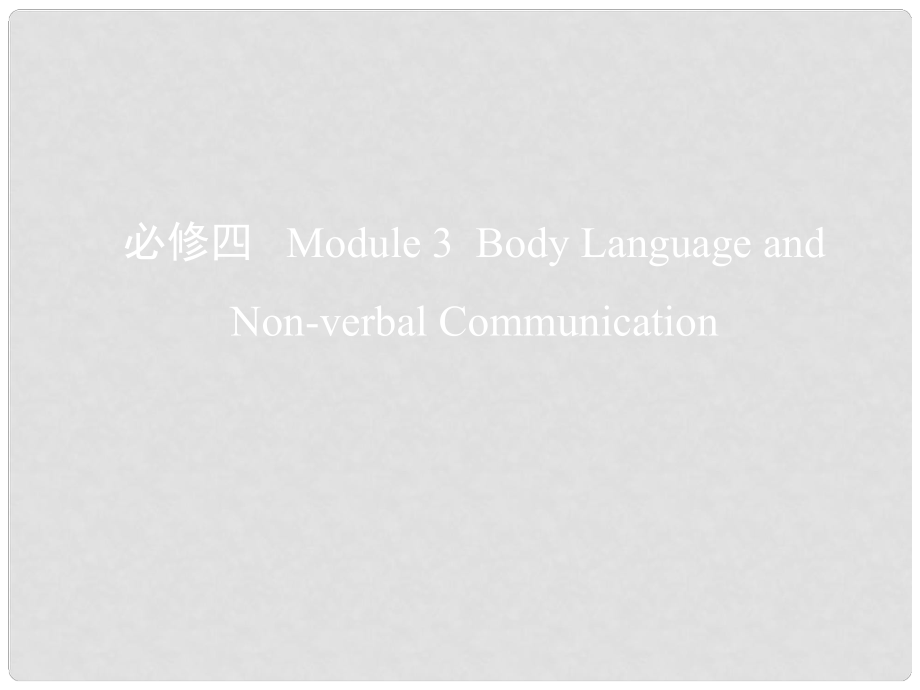《高考英語(yǔ)一輪復(fù)習(xí) 第一部分 教材課文要點(diǎn) Module 3 Body Language and Nonverbal Communication課件 外研版必修4》由會(huì)員分享�����,可在線閱讀��,更多相關(guān)《高考英語(yǔ)一輪復(fù)習(xí) 第一部分 教材課文要點(diǎn) Module 3 Body Language and Nonverbal Communication課件 外研版必修4(33頁(yè)珍藏版)》請(qǐng)?jiān)谘b配圖網(wǎng)上搜索。
1��、必修四 Module 3 Body Language andNon-verbal Communication語(yǔ)言點(diǎn)用法過(guò)關(guān)語(yǔ)言點(diǎn)用法過(guò)關(guān)1.vary v.改變;使多樣化;變化教材原句教材原句 We see examples of unconscious body language very often, yet there is al-so “l(fā)earned” body language, which varies from culture to culture.我們經(jīng)常看到無(wú)意識(shí)的身勢(shì)語(yǔ),但也有“習(xí)得”的身勢(shì)語(yǔ)。它們?cè)诓煌奈幕懈鞑幌嗤?��。語(yǔ)境應(yīng)用語(yǔ)境應(yīng)用單句填空單句填空The prices
2、 of some vegetables vary with the weather.Varieties of goods are (be)now popular with the customers.They grow a variety (various)of crops, including wheat and barley.單句改錯(cuò)單句改錯(cuò)In our country, the variety of apples are increasing at present. areisThe students should be encouraged to take part in variet
3、y of after-class activities.varietyvarieties或在或在variety之前添加之前添加a語(yǔ)段填空語(yǔ)段填空With the development of economy, there are varieties (vary)of goods in various (vary)stores at the present time , varying (vary)from daily gro-ceries to luxury goods, which greatly enriches peoples life.In addition, the goods va
4��、ry with the season, and it is very convenient for consumers.用法點(diǎn)撥用法點(diǎn)撥(1)vary with隨變化vary in在方面變化(2)various adj.各種各樣的variety n.多樣化;種類a variety of(=varieties of)不同種類的,各種各樣的【點(diǎn)津】【點(diǎn)津】a variety of/varieties of(許多的)+可數(shù)名詞復(fù)數(shù)作主語(yǔ)時(shí),謂語(yǔ)動(dòng)詞用復(fù)數(shù)形式���。a variety of/varieties of(許多的)+不可數(shù)名詞作主語(yǔ)時(shí),謂語(yǔ)動(dòng)詞用單數(shù)形式��。the variety of(表種類)+
5、可數(shù)名詞作主語(yǔ)時(shí),謂語(yǔ)動(dòng)詞用單數(shù)形式�。2.involve vt.包括;需要教材原句教材原句Greetings in Asian countries do not involve touching the other person.亞洲人打招呼是不接觸他人身體的 語(yǔ)境應(yīng)用語(yǔ)境應(yīng)用單句填空單句填空Planning a balanced diet involves (involve) trying new and different kinds of foods.Scientists have long wondered which parts of the brain are involved (
6、in-volve) in musical tasks.Getting your students involved (involve)in classroom activities is vitally important.There is a new problem involved (involve)in the popularity of private cars that road conditions need to be improved.We believe the time and hard work involved in completing (complete) such
7��、 an important project are worthwhile寫(xiě)作微練寫(xiě)作微練預(yù)習(xí)功課,積極參與課堂活動(dòng),課后復(fù)習(xí)老師所教的東西確實(shí)使我受益匪淺�����。It really benefited me a lot to preview lessons, get actively involved in class and review what had been taught by the teachers after class .用法點(diǎn)撥用法點(diǎn)撥(1)involve sb. in(doing)sth. 使某人參與(做)某事;使某人牽扯到某事中involve doing sth. 包括做某事
8��、(2)involved adj.復(fù)雜的;有牽連的;有關(guān)的get/be involved in被卷入之中;熱衷于;專心于get/be involved with sb./sth. 與某人在一起/和某事有密切聯(lián)系3.request n.& v.請(qǐng)求;要求教材原句教材原句Mr and Mrs Harry Blunkett request the pleasure of your company at the wedding of.哈里布朗奇夫婦恭請(qǐng)您參加的婚禮�����。語(yǔ)境應(yīng)用語(yǔ)境應(yīng)用單句填空單句填空Visitors are requested not to touch (not touch) the ex
9���、hibits.We should consider the students request that the school library provide more books on popular science.I request that you (should) finish (finish) the task on time.Now I come here at the request of Mr. Smith to assist him in finishing the work.The library will lend you the book on request. 句型轉(zhuǎn)
10、換句型轉(zhuǎn)換They requested us not to smoke in the office.They requested that we should not smoke in the office.It was requested that we should not smoke in the office.用法點(diǎn)撥用法點(diǎn)撥(1)request sb. to do sth. 要求某人做某事request that 要求 It is requested that sb. (should)do據(jù)要求某人(應(yīng)該)做request sth. from sb. 向某人請(qǐng)求某物(2)at one
11�、s request=at the request of sb. 應(yīng)某人的請(qǐng)求make a request for.請(qǐng)求/要求upon/on request一經(jīng)要求;應(yīng)要求【點(diǎn)津】【點(diǎn)津】request后接從句時(shí),從句謂語(yǔ)動(dòng)詞使用“(should+)動(dòng)詞原形”。4.favour(favor) n.恩惠;善意的行為;贊成;偏袒 vt.選擇;偏袒教材原句教材原句Can I ask you a favour?我可以請(qǐng)你幫個(gè)忙嗎?語(yǔ)境應(yīng)用語(yǔ)境應(yīng)用完成句子完成句子Most of them were in favour of my opinion while David was against it.他們大
12��、多數(shù)人支持我的觀點(diǎn),然而,戴維卻反對(duì)���。句型轉(zhuǎn)換句型轉(zhuǎn)換Can I ask you a favour?Can I ask a favour of you?Do me a favour and turn the TV down while Im on the phone. Do a favour for me and turn the TV down while I m on the phone.賞句猜義賞句猜義寫(xiě)出下面句中favour的意思��。He divided the candy among the children without favour to anyone. 偏袒偏袒用法點(diǎn)撥用法點(diǎn)撥
13、(1)ask a favour of sb.=ask sb. a favour請(qǐng)某人幫忙do a favour for sb.=do sb. a favour給某人恩寵;幫某人忙in/out of favour得寵/失寵in ones favour有利于某人in favour of支持,贊同(2)favourable adj.贊同的,有利的favourite adj.最喜愛(ài)的1.hold up舉起,抬起;阻礙;攔路搶劫;支撐教材原句教材原句 One person then holds up his hand,palm outwards and five fingers spread.然后一個(gè)人
14、舉起他的手,手掌向外,五指張開(kāi)�。語(yǔ)境應(yīng)用語(yǔ)境應(yīng)用賞句猜義賞句猜義寫(xiě)出下列句中hold up的含義����。Hold up your hands if you have any question. 舉起舉起An accident is holding up traffic. 阻止阻止;延誤延誤There are two large wooden supports that hold up the roof. 支撐支撐His brother tried to hold up the passer-by and was sent to prison. 搶劫搶劫完成句子完成句子 Hold on a momen
15、t and I will go to your rescue.堅(jiān)持一下,我這就去救你�����。We thought of selling this old furniture. But weve decided to hold on to it. It might be valuable.我們?cè)瓉?lái)考慮賣掉這件舊家具, 但我們現(xiàn)在決定留著它,它可能會(huì)很值錢��。 用法點(diǎn)撥用法點(diǎn)撥hold on稍等;別掛斷(電話);(在困難或危險(xiǎn)中)堅(jiān)持住hold out堅(jiān)持;維持;伸出hold on to保存(某物);抓緊;不放開(kāi)hold down按住(某人);限制hold up舉起;抬起;阻礙;攔路搶劫;支撐2.give
16����、 away 暴露(自己的情況);泄露(秘密);贈(zèng)送;頒發(fā)教材原句教材原句People give away much more by their gestures than by their words.人們的姿勢(shì)暴露的自己的情況比語(yǔ)言多得多�����。語(yǔ)境應(yīng)用語(yǔ)境應(yīng)用選詞填空選詞填空(give away/give up/give out/give way to)He often came to check their studies and give out new assignments.He gave away most of his money to the homeless in the ear
17、thquake-stricken area.Despite all these discouragements, she refused to give up .We mustnt give in to these unreasonable demands.用法點(diǎn)撥用法點(diǎn)撥give back歸還,恢復(fù)give in(to)屈服;讓步give off放出;散發(fā)give out分發(fā);用完;耗盡;發(fā)出give up放棄;認(rèn)輸give way to給讓路/讓步;被代替1.獨(dú)立主格結(jié)構(gòu) 教材原句教材原句One person then holds up his hand , palm outwards a
18、nd five fingers spread.然后一個(gè)人舉起他的手,手掌向外,五指張開(kāi)���。語(yǔ)境應(yīng)用語(yǔ)境應(yīng)用單句填空單句填空The party will be held in the garden, weather permitting (permit).Much time spent (spend) sitting at a desk, office workers are generally troubled by health problems.Bats are surprisingly long-lived creatures, some having (have) a life span of around 20 years.Mary chosen (choose) as the most excellent competitor, all the audience stood up and cheered.用法點(diǎn)撥用法點(diǎn)撥獨(dú)立主格結(jié)構(gòu)的構(gòu)成方式:(1)名詞/代詞+形容詞/副詞/介詞短語(yǔ)(2)名詞/代詞+現(xiàn)在分詞(3)名詞/代詞+過(guò)去分詞(4)名詞/代詞+不定式【點(diǎn)津】【點(diǎn)津】獨(dú)立主格結(jié)構(gòu)在句中作狀語(yǔ),表示時(shí)間、條件、原因或伴隨等,其邏輯主語(yǔ)是名詞/代詞,與句子的主語(yǔ)不同��。
 高考英語(yǔ)一輪復(fù)習(xí) 第一部分 教材課文要點(diǎn) Module 3 Body Language and Nonverbal Communication課件 外研版必修4
高考英語(yǔ)一輪復(fù)習(xí) 第一部分 教材課文要點(diǎn) Module 3 Body Language and Nonverbal Communication課件 外研版必修4

